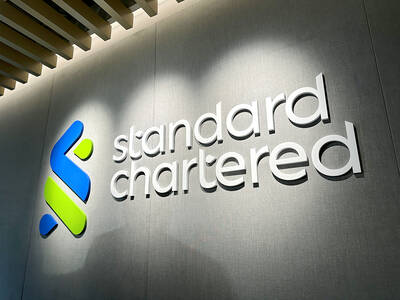The local finance sector reported combined pretax profit of NT$675.7 billion (US$23.77 billion) last year, up 6.5 percent from a year earlier, the Financial Supervisory Commission said yesterday, attributing the record-high to life insurers’ investment gains and securities firms’ fee incomes.
Life insurers reported combined pretax profit of NT$206.1 billion, up 33.2 percent year-on-year, on the back of investment gains of NT$83 billion in global stocks markets, commission data showed.
Meanwhile, life insurers recorded NT$296.8 billion in foreign-exchange losses and hedging expenses last year, up 1.92 percent from a year earlier, due to the New Taiwan dollar’s appreciation against the US dollar, the commission said.
The NT dollar rose 5.6 percent against the greenback last year.
About two-thirds of life insurers’ investment portfolios, totaling more than NT$18 trillion, are overseas investments or denominated in US dollars, it said.
The life insurance industry posted combined losses of NT$581 billion in the valuation of their US dollar-denominated assets as of the end of last month, which was partly offset by gains of NT$436 billion in the valuation of their hedging tools denominated in NT dollar or other Asian currencies, the commission said.
Hedging expenses totaled NT$160 billion last year, it said.
Property insurers’ combined pretax profit grew 6.3 percent annually to NT$17 billion, the data showed.
Last year, securities companies reported combined pretax profit grew 51 percent year-on-year to NT$65.8 billion, futures companies’ pretax profit expanded 17 percent to NT$5 billion and securities investment trust firms’ pretax profit increased 20 percent to NT$10.9 billion, all hitting the highest in nine years, the commission said.
However, banks’ profits fell last year, as their combined pretax profit decreased 13 percent to NT$312.7 billion due to declining interest income, foreign exchange losses and lower investment gains, it said.

South Korea’s equity benchmark yesterday crossed a new milestone just a month after surpassing the once-unthinkable 5,000 mark as surging global memory demand powers the country’s biggest chipmakers. The KOSPI advanced as much as 2.6 percent to a record 6,123, with Samsung Electronics Co and SK Hynix Inc each gaining more than 2 percent. With the benchmark now up 45 percent this year, South Korea’s stock market capitalization has also moved past France’s, following last month’s overtaking of Germany’s. Long overlooked by foreign funds, despite being undervalued, South Korean stocks have now emerged as clear winners in the global market. The so-called “artificial intelligence

Chinese artificial intelligence (AI) start-up DeepSeek’s (深度求索) latest AI model, set to be released as soon as next week, was trained on Nvidia Corp’s most advanced AI chip, the Blackwell, a senior official of US President Donald Trump’s administration said on Monday, in what could represent a violation of US export controls. The US believes DeepSeek will remove the technical indicators that might reveal its use of American AI chips, the official said, adding that the Blackwells are likely clustered at its data center in Inner Mongolia, an autonomous region of China. The person declined to say how the US government received

FORTUNES REVERSED: The new 15 percent levies left countries with a 10 percent tariff worse off and stripped away the advantage of those with a 15 percent rate In a swift reversal of fortunes, countries that had been hardest hit by US President Donald Trump’s tariffs have emerged as the biggest winners from the US Supreme Court’s decision to strike down his emergency levies. China, India and Brazil are among those now seeing lower tariff rates for shipments to the US after the court ruled Trump’s use of the International Emergency Economic Powers Act to impose duties was illegal. While Trump subsequently announced plans for a 15 percent global rate, Bloomberg Economics said that would mean an average effective tariff rate of about 12 percent — the lowest since

Standard Chartered Bank Taiwan’s newly appointed chief executive officer, Anthony Yu (游天立), yesterday unveiled an ambitious growth strategy for the bank’s wealth management division, reflecting a bullish outlook on Taiwan’s high-net-worth market. Yu, the first local executive to lead Standard Chartered Bank’s Taiwan operations, emphasized rising client demand and detailed plans to expand the bank’s digital capabilities, as well as its physical presence across the country. Standard Chartered Taiwan saw a remarkable surge in new wealth management clients last month, with the number of clients holding assets equivalent to US$1 million more than doubling compared with the same month last year, he